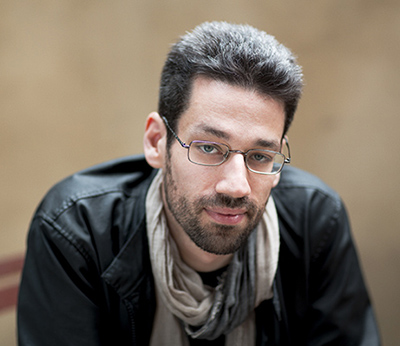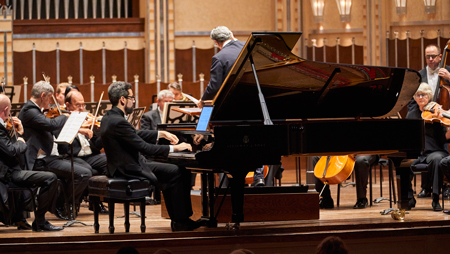by Mike Telin

In November of 2017 Biss gave The Cleveland Orchestra premiere of Salvatore Sciarrino’s Piano Concerto: Il sogno di Stradella, (Beethoven No. 4). He’ll follow that up on Saturday, August 28 at 7:00 pm at Blossom Music Center with Caroline Shaw’s Watermark (Beethoven No. 3).
“Being with The Cleveland Orchestra is always special for me,” Biss said during a recent telephone conversation. “And given that I played the Sciarrino in Cleveland, I need to talk about how different the two pieces are and how unbelievably different the composers’ approaches to the project were.”
Biss noted that the connection between the Sciarrino and the fourth concerto is so oblique that he had to “go hunting for it.” But with Watermark, Caroline Shaw clearly uses the third concerto as its starting point.
“Caroline said something that I found very interesting. She said that she was trying to ‘write the writing process of Beethoven,’ which I think was her way of saying that she’s imagining how Beethoven might have found his way toward many of the ideas that ended up being central to the third concerto. I think it’s interesting because although I’ve spent my whole life immersed in great music, I don’t think I understand all that much about how the creative process works — how a composer gets from a blank page to a fully realized piece of music. So I find it incredibly fascinating to hear someone like Caroline, whose life’s work is being a composer, engage with the question of how someone else conceives of a piece of music.”
Biss said that Shaw has a “compelling presence” because of her interesting life. The Pulitzer Prize-winning composer is also a member of the acclaimed vocal ensemble Roomful of Teeth. “And she’s an excellent violinist who premiered her own violin concerto. So she comes at questions from very different, but all very authentic viewpoints, which makes her a fascinating person to talk to.”
Although Watermark was premiered by Biss and the Seattle Symphony in January of 2019, the pianist said there have been few if any changes made to the score. But since that time, his understanding of the concerto has definitely evolved. “I think I’ve played it with five or six orchestras, but until you have the experience of performing it from beginning to end in front of people, there are certain things about how the piece works that you just don’t understand. So every time I came back to it, I felt like my understanding of it was a little bit different and a little bit richer.”
Biss said that an interesting aspect of the concerto is that while the music may begin with Caroline Shaw it gradually morphs into Beethoven. “And on the opposite side of the coin, it often starts with Beethoven and then moves into Caroline Shaw. I had a lot to do to figure out the best way to negotiate that. It has — I wouldn’t say an improvisatory quality — but a feeling of something you have to experience in the moment. So it changes every time, and it’s been really fun to imagine the different possibilities the piece suggests.”
In addition to Salvatore Sciarrino and Caroline Shaw, the other Beethoven/5 composers are Timo Andres (Concerto No. 2), Sally Beamish (Concerto No.1), and Brett Dean (Concerto No. 5). “It’s sad because the premiere of Brett’s piece was in February of 2020 and because so many performances kept getting cancelled, I’ve only played it twice — but I am supposed to play it four more times this coming year. The piece is fantastic, but I haven’t been able to go through the process of discovering it through performance.”
Now that the project is complete — all the concertos have all been written and premiered — did Beethoven/5 turn out the way Biss had imagined? “It’s absolutely what I thought it would be in the sense that the concertos are incredibly varied. Because of that, they kind of reflect how enormous Beethoven’s footprint on the musical world is.”
The pianist said that when he commissions a work he doesn’t have expectations about the results. “I will say that I love these concertos, and having five works by five wonderful composers that wouldn’t exist otherwise is something that I’m most proud of. I think I’ve said this to you before, but my sincerest hope is that these pieces have a life beyond me and that they are taken up by other people and in time become part of the repertoire.”

He added that multiple performances of a new work are crucial to its success. “There is so little information to be gained from hearing a piece just once. You need to hear it multiple times for it to become part of your consciousness, so to give a piece the proper chance it has to have a shelf life longer than one night.”
During the past few years the Beethoven/5 project isn’t the only way that Biss has been surrounding himself with Beethoven. He has been offering online lectures about the composer’s 32 piano sonatas and recording them.
“I would say that I was immersed and obsessed with his music during that period. On the one hand I can’t really think of a more worthy object of obsession than Beethoven’s music. But he’s a tricky person to be living with all the time because his personality is so enormous and so uncompromising. So to say that it was overwhelming is like the understatement of my life. And during COVID it’s been wonderful to realize how much I need other kinds of music in my life. Music that’s great and comes from different sources other than that relentless intensity that is Beethoven’s natural language.”
Wrapping up our conversation, I ask Jonathan Biss to complete the sentence: Beethoven does ___ to me. After a long pause he said, “That’s a very good question — I think I would say, ‘Beethoven makes me question everything.’ His music is so all-encompassing that there are many ways I could respond, but I think maybe that says it in one idea.”
Saturday’s concert, under the direction of Vinay Parameswaran (replacing Elim Chan), will also include Beethoven’s Coriolan: Concert Overture and Elgar’s Enigma Variations. Tickets are available online.
Photo of Biss performing the Sciarrino concerto at Severance Hall by Roger Mastroianni, courtesy of The Cleveland Orchestra.
Published on ClevelandClassical.com August 24, 2021.
Click here for a printable copy of this article



